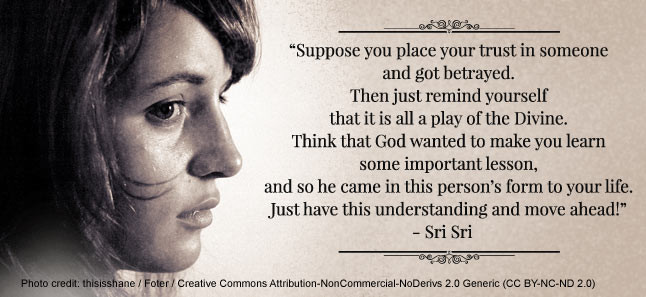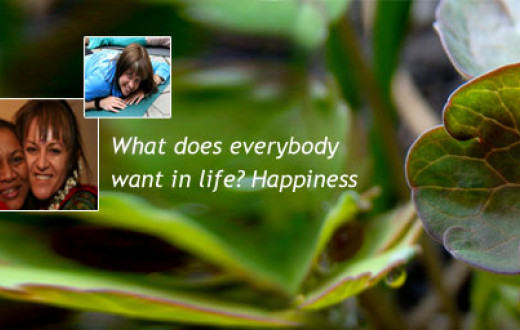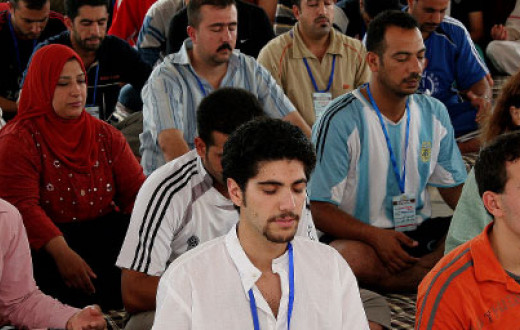
(Below is a continuation of the post Real Faith Leads To Everlasting Happiness)
Even then be grateful to God.
What good is the faith that shakes? Faith is that which remains firm even during tough times. Suppose you place your trust in someone and got betrayed. Then just remind yourself that it is all a play of the Divine. Think that God wanted to make you learn some important lesson, and so he came in this person’s form to your life.
So just see the situation with this understanding.
Why am I saying this? See, in the end, it is all one consciousness which assumes different forms and different ways to teach us something important in life. So have this understanding and just move ahead.
Do not go looking for faults in others. If you do so, then you will find numerous flaws even in all the avatars (incarnations of the Divine).
You will find flaws with Narasimha Avatar (a fierce incarnation of Lord Vishnu as half-man, half-lion); the Vamana Avatar (the incarnation of Lord Vishnu as a young Brahmin boy seeking alms). In Lord Parshurama you will see so many flaws. You will also find faults with Lord Rama. And don’t even ask about Lord Krishna! (Laughter)
If you get stuck in this habit of finding flaws, then you will find flaws and shortcomings everywhere and in every person.
To improve one’s understanding, our Puranas (sacred Hindu scriptures of mythology) have linked even flaws and shortcomings with some or the other form of Divinity. So in the Puranas, you find stories in which even the ever-blissful Lord Shiva gets angry; Devi Parvati (a form of the Mother Divine) also gets angry, and the ever-smiling Lord Vishnu too becomes sad and dejected.
So our Puranas have shown all these flaws and distortions in the deities also, to make you understand that Divinity is truly all-encompassing, and even flaws or shortcomings are an aspect of the Divine.
Be it perfection or shortcomings - there is nothing beyond the Divine. So the Puranas have portrayed even the deities with a few flaws, to make you capable of accepting such things with ease, rather than getting entangled with it.
Divinity is all-encompassing and beyond all attributes – whether good or bad. That is why when we worship the Mother Divine, we say, 'Prakratim vikratim vidhyam'. It means that both good qualities and their distortions are in the Mother Divine.
This is how our scriptures have mentioned about the Divine. This (understanding of duality) is a step towards the Advaita Siddhanta (the philosophy of Non-duality of the Divine).
The Advaita philosophy is the highest of all, and it is also the essence of everything that exists. It says that everything is one and everything arises from that One Divinity only, so that you do not forget the totality of Divinity, or misunderstand the Divine in any way.
Our wise sages have described the aspects of Divinity in a very beautiful manner. This is why even flaws have been given a rightful place and have been shown as an aspect of the Divine.
All the six distortions that we know – anger, greed, lust, jealousy, attachment, false pride and delusion – are represented through various deities, to only strengthen your faith in the Divine. The wise sages did this to pave a path for you to move forward towards the Divine.
Just know that the seeds of all such karmas of the past lives get burnt once you come here. So just relax and be happy.
Suppose you have a house that has been locked away for a 100 years. Now you will ask, 'O Gurudev, how can one remove the darkness of 100 years in just a day?'
I tell you, the moment the lamp of knowledge has been lit in your heart, all the darkness (of ignorance and negativity) vanishes away in an instant. In the same way, the seeds of all your past karmas burn away as you go deeper and deeper into Self-knowledge.
When you realize with awareness that 'I am not this body, I am the eternal spirit', any negative effects of your past karmas will simply disappear without affecting you.
These are four ways of persuasion:
When someone does something wrong or misbehaves with us, what do we do? First, we gently make them understand how they are wrong. Many people unknowingly commit a mistake, so once they understand that they are making a mistake, they do not repeat it the next time – this approach is called Saama (meaning to explain by persuasion).
You cannot blame someone for a mistake that they have made unknowingly. So Saama means to explain to the other person the mistake he has committed and to make him aware of it.
Now, even after explaining the mistake, if they still go on repeating it, then what should you do? Then you should forgive them by saying, 'See, you realize that this is wrong, is it not? I forgive you, now do not do it again'. This is Daama.
So, at first, you make them aware without making them feel like a culprit. If they repeated it, then you make them feel responsible for the mistake, and forgive them.
You should never make a person feel like a culprit in the very first time of committing a mistake unknowingly. See, if you create guilt within them by blaming them at the very first instance, then they will never improve their ways. They will never be able to gain awareness and overcome their wrong ways.
So after Saama comes Daama.
Suppose even after doing all this, they continue to repeat their mistakes, then you need to adopt the approach of Danda (punishment). And if punishment also does not work, then one needs to adopt the way of Bheda (meaning to change one’s behaviour towards the other person).
Then you tell them, 'Okay, since you continue to repeat this mistake even after my telling you so many times, I am not going to behave the same way with you anymore'.
This will make them feel a pinch of guilt about what they have done, and they will understand the pain of their mistake.
Danda is the last measure one needs to adopt. When someone does not listen even after doing everything else, then you need to pick up a stick to make them understand. Someone who does not understand and improve their ways even after explaining and persuasion, will only understand through punishment (Danda).
See, sometimes we become aware of our own capabilities, and sometimes we come to know about them when someone else speaks about them, or when we hear about it from some third person.
For quite some time, Lord Hanuman was not aware of his strengths too. Someone had to tell him that he was endowed with so much strength and so many abilities.
Sometimes we also get to know about our capabilities from others.
Now, what should you do to know more about them? When you think, 'I am able to do only this much', then just take one step further and see for yourself how you fare. Do not stop by thinking, 'I am not able to do this'.
Just think, 'Let me see how much more can I do', and take one more step ahead.
Yoga is what helps enhance and sharpen one’s capabilities. Yoga is not limited to doing Yogasanas and Pranayamas. Yoga means to unite totally with what you are doing; to become one with the Divine.
All these (yoga) practices enhance our capacity and capabilities. How many of you here felt that ever since you came on the path of Sadhana, your qualities and capabilities have increased much more? (Many in the audience raise their hands) Do you see a difference between what you used to do earlier and what you are doing now? When you came to the path of knowledge, your capability increased, isn’t it? That is what it is.




































